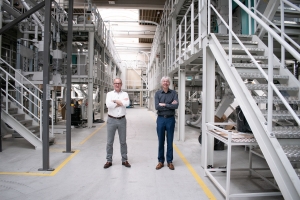


(Posted on 05/03/21)
|
Bühler Group and Vyncke have formed a strategic partnership to offer integrated solutions with which biomass side stream products are transformed into clean process energy while reducing the customers’ carbon footprint. The dependency on fossil fuels – and with this, CO2 emissions – can decrease from 20%-100%, depending on the raw material and side stream products. This means that in some cases, food plants can become fully carbon neutral. The first focus of the partnership is the segments of cocoa, oat, and malt processing. “This partnership is a key element in our strategy to massively reduce CO2 in the value chains of our customers,” says Johannes Wick, CEO of Bühler Grains & Food. “Many industries rely on our solutions to reduce their fossil fuel consumption. With Bühler, we now aim to also become the standard to reduce the CO2 footprint of the food industry,” says Peter Vyncke, owner of Vyncke. “Together, Bühler and Vyncke can now offer integrated and optimized solutions where economic and ecological benefits go hand in hand.” |
|
Biomass by-products are generated in almost all food processes. Typical examples are the processing of grains, rice, corn, and cocoa. Today, by-products are often either used for animal feed or simply disposed of. From biomass by-products, food manufacturers can also produce a climate-neutral form of energy. Unlike the combustion of fossil fuels, the use of biomass energy helps controlling greenhouse gas emissions as the only fraction released corresponds to what the plants previously took from the atmosphere during their growth, which is less than transporting the side stream products to a place where they would be used for feed or disposal. This creates a neutral CO2 cycle. With new equipment, digital services and retrofit offerings, Bühler already made strong progress in making its solutions more energy efficient. “By adding Vyncke's energy recovery processes to our portfolio, we can offer our customers low- to zero-carbon food solutions,” says Johannes Wick. Belgian technology supplier Vyncke specializes in energy production from a wide range of biomass by-products, including industrial or municipal wastes. The range of biomass-based fuels available for energy production is broad; from agricultural and wood residues to sludges from industrial processes, recycled wood, and specially grown energy crops. Vyncke designs and builds green and clean energy systems that combust biomass and waste to produce thermal process energy from 1-100 megawatt hours (Mwh) and electrical energy from 0.5-15 megawatt electrical (Mwe). Outside of energy-intensive industries, most companies have tended to view energy procurement as a cost to be managed rather than a strategic area in the value chain. Yet today, energy is becoming one of the most important levers for business success. With their cooperation, Bühler Group and Vyncke are addressing this issue to develop solutions for more sustainable food production – with holistic process chains in which energy recovery is integrated so that external energy consumption and energy costs can be reduced. This not only contributes to greater sustainability, but also opens competitive advantages for food producers through greater energy efficiency. “Today, we are far from exploiting the full potential of recovering energy from side stream products. Our goal is to reduce the energy consumption of a food plant by up to 70%. The beauty of our solutions is that sustainability and economic criteria go hand in hand. Today, we are already enabling our customers to reduce emissions by 2.5 million tons of CO2 annually. By partnering with Bühler, we can further improve and scale these solutions in an integrated approach to create a much larger positive impact,” says Peter Vyncke. |
The National Grain and Feed Association (NGFA) has applauded Senator Deb. Fischer’s (R-Neb.) reintroduction... Read more
Anglo American plc and Teck Resources Limited have received regulatory approval from the Government... Read more
The Rhodes Ridge Joint Venture has approved a $191 million (A$294 million) (Rio Tinto share $96 million... Read more
Trafigura Group Pte Ltd, a global leader in the commodities industry, has announced its financial results... Read more
Rio Tinto has successfully produced the first copper from the Johnson Camp mine in Arizona using its... Read more
The American Soybean Association’s World Initiative for Soy in Human Health programme and the... Read more
Karlka Nyiyaparli Aboriginal Corporation (KNAC) Registered Native Title Body Corporate and Rio Tinto... Read more
OCI Global, a leading global producer and distributor of nitrogen products has announced that it has... Read more
In December 2024, SSAB was granted a permit by the Land and Environment Court at Umeå District... Read more
The President of the Republic of Guinea has joined project partners WCS1, Baowu, Chinalco and Rio Tinto... Read more